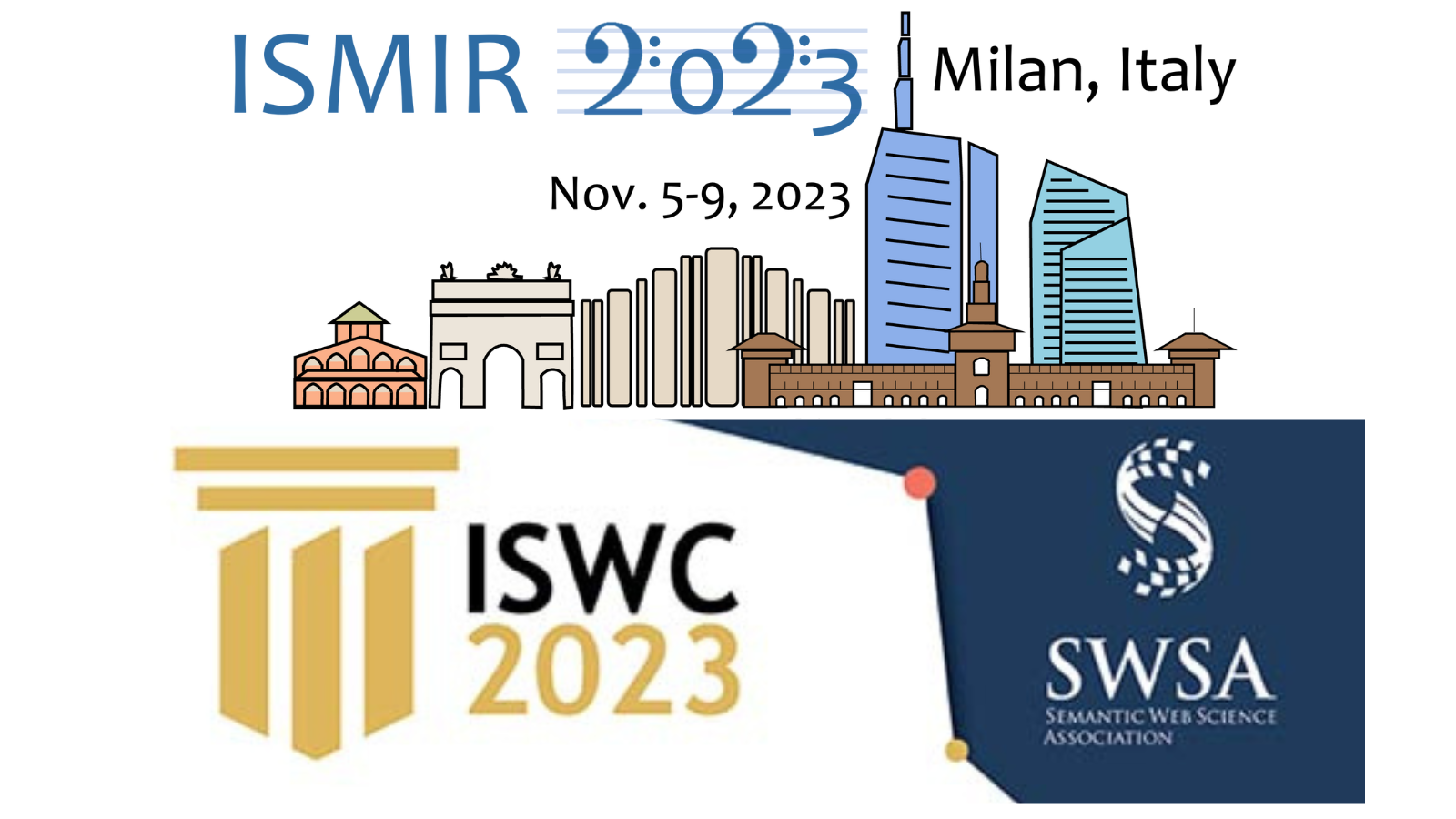Polifonia is getting ready for a conference heavy week: DLfM, ISMIR and ISWC2023!
This is a week of major importance to the Polifonia team, as its researchers join both the conference of the International Society for Music Information Retrieval (ISMIR) and the conference for the International Semantic Web and Linked Data Community (ISWC): venues of significant importance for both research and industry. Read more about Polifonia’s contributions below.

This is a week of major importance to the Polifonia team, as its researchers join the conference of the International Society for Music Information Retrieval (ISMIR), the conference for the International Semantic Web and Linked Data Community (ISWC) and the Digital Libraries for Musicology Conference (DLfM): venues of significant importance for both research and industry. Read more about Polifonia’s contributions below.

Joining the forum for music technology in Milan, Nov, 5-9.
Polifonia is looking forward to present not 1, but 2 articles at the ISMIR conference — the major venue for Music Information Retrieval and Music Technology, which includes sponsors such as Google, Universal, Deezer, Yamaha and Adobe.

The paper The Music Meta Ontology, by Jacopo de Berardinis, Valentina Anita Carriero, Albert Meroño-Penuela, Andrea Poltronieri and Valentina Presutti, encapsulates the vision of the INTERLINK pilot and it is a foundational model in PON (Polifonia Ontology Network). The semantic description of music metadata is a key requirement for the creation of music datasets that can be aligned, integrated, and accessed for information retrieval and knowledge discovery. It is nonetheless an open challenge due to the complexity of musical concepts arising from different genres, styles, and periods – standing to benefit from a lingua franca to accommodate various stakeholders (musicologists, librarians, data engineers, etc.). To initiate this transition, the University of Bologna and King’s College London introduce the Music Meta ontology, a rich and flexible semantic model to describe music metadata related to artists, compositions, performances, recordings, and links.
The paper Algorithmic Harmonization of Tonal Melodies by ORGANS pilot leader Peter van Kranenburg (Universiteit Utrecht, (Meertens Instituut) and Eoin J Kearns (Meertens Instituut), is also presented during ISMIR. Most melodies from the Western common practice period have a harmonic background, i.e., a succession of chords that fit the melody. In the paper by van Kranenburg and Kearns a novel approach to infer this harmonic background from the score notation of a melody is provided. The algorithm based system they suggest, is heavily parameterised, extremely flexible, and does not need training. This creates a framework to experiment with harmonization of melodies. The output of the system is evaluated by an expert survey, which yields convincing and positive results.

Shaping the future of semantic technologies in Athens, Nov, 6-10.
In the meantime, Nicolas Lazzari presents a central pillar of Polifonia: the Polifonia Ontology Network (PON) at the ISWC conference. ISWC2023 brings together researchers, practitioners, and industry specialists to discuss, advance, and shape the future of semantic technologies.

The Polifonia Ontology Network: Building a Semantic Backbone for Musical Heritage tackles the problem that current music data annotation models lack interoperability and are insufficient for representing music history and the cultural heritage context in which it was generated. Polifonia created a solution, and proposes Polifonia Ontology Network (PON). PON centres around four modules: Music Meta (metadata), Representation (content), Source (provenance) and Instrument (cultural objects). PON is designed with a strong accent on cultural stakeholder requirements and competency questions. Nicolas will also show current and future use of these resources by internal project pilots, early adopters in the music industry, and opportunities for the Semantic Web and Music Information Retrieval communities.
Being part of the premier venue for scholars engaging with digital libraries in the domain of music and musicology, 10th November 2023
Peter and Eoin return to action at the 10th International Conference on Digital Libraries for Musicology, held as a satelite event of the ISMIR Conference on Friday, Nov. 10. The Digital Libraries for Musicology (DLfM) conference provides a forum for musicians, musicologists, librarians and technologists to exchange findings and expertise. Polifonia team memembers are participating in the afternoon session on analysis tools and similarity studies.
With the short paper Cross-Corpus Melodic Similarity For Enriching Archival Collections Peter and Eoin present initial results of interlinking several large tune collections. This is achieved through the use of a similarity measure algorithm to create ranked lists and to find highly similar pairs between collections. These pairs can reveal previously unknown links between melodies, allowing for archival enrichment and metadata correction. They can also establish connections between culturally distinct music collections, and allow for a broader understanding of musical heritage. We provide examples of how this algorithm has resulted in corrections and additions to the Dutch Song Database.










